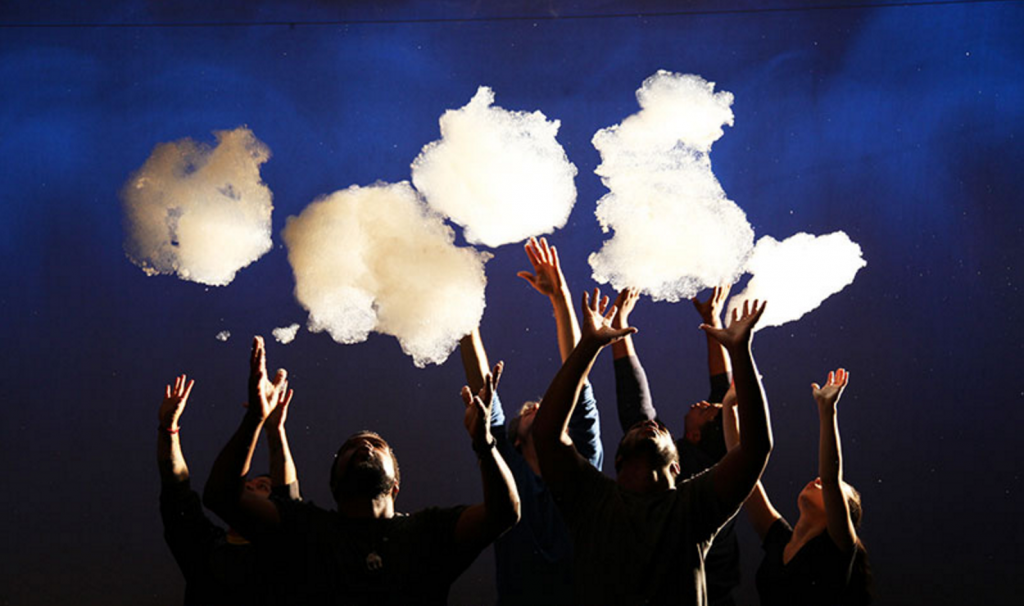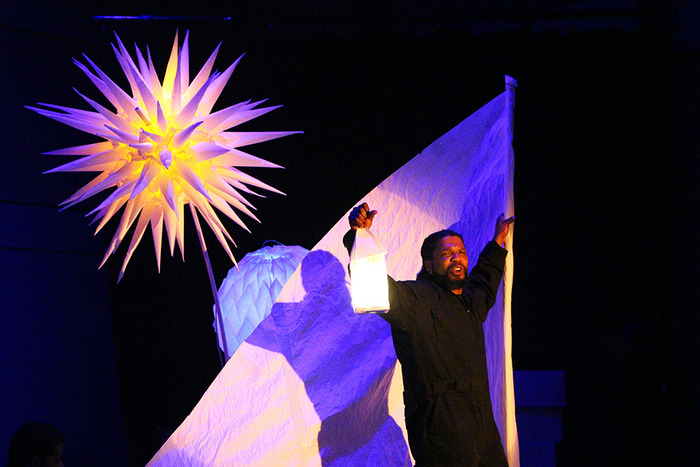
Multidisciplinary artist and cast member Christopher Johnson performing during Freedom Project.
What are the conditions that have transformed the “land of the free” into the most incarcerating country in the world? What’s the line between a “good kid” and a “bad kid”? How do race and class determine our interactions with the criminal justice system? These questions are at the center of Freedom Project, a multimedia physical theater piece produced by the Everett Company Stage and School based out of Providence, Rhode Island.
Recent media including Michelle Alexander’s formative book, The New Jim Crow, and Ava DuVernay’s The 13th have brought into public conversation the origins and impacts of an issue that’s remained invisible throughout this country’s history: racialized and classist mass incarceration. For every two White people jailed in the United States, 11 Black people are imprisoned; the country’s prison population as a whole has risen by 500 percent since the War on Drugs was instituted. As Angela Davis wrote in her seminal work, Are Prisons Obsolete? — which is read from in part during the performance — “The prison has become a black hole into which the detritus of contemporary capitalism is deposited.”
Freedom Project makes personal these systems and statistics; their work is rooted in both extensive research and personal experience. Artists Christopher Johnson, a multidisciplinary performer and spoken-word artist, and James Monteiro, another artivist and the founder of Reentry Campus, will share their own stories at the SPACE debut.
In an email interview, Christopher told me that this “humanization” of the country’s incarceration crisis is a driving intention of the artists. “One of the reasons mass incarceration exists is because the victims of the criminal justice system are not looked at as human,” he writes. “Say what you want, but you see an image on television that doesn’t look like you, you can’t talk to it, you can’t relate and in some sense it’s not real to you. In the theater we are right there, not just an image but a body, and the experience draws you from your reality (which is the purpose of theater) and one can empathize, even if they never had an incarcerated family member or have never been caught up in the criminal system themselves.”
“Working with Everett has been one of the most cathartic experiences I have had as an artist,” writes Christopher. More than ten years ago, when he was looking to change and grow as both a community member and an artist, he composed a one man show. “I didn’t want to be the black kid from the bricks fighting the world anymore. I didn’t want peoples’ first impression of me to be my skin color and all the stigma that came with it … I wanted to be the ever changing artist, the stand up community member, I wanted to be seen for me … So I wrote the show.”
Ten years later, now part of Everett, he approached Aaron Jungels, Artistic Director at Everett, with his material after hearing about Freedom Project. “I realized they were telling my story. I told Aaron I wanted to be a part of this. They were only one year in on the three year process of creating the show, so we talked. I gave him a lot of my writing, poems, essays, and the show.” Aaron pulled the material he thought was most poignant to help design Freedom Project, and Christopher became absorbed in the process.
Aside from the raw material brought by its actors — all of whom have been personally affected by the prison system in one form or another — Everett holds regular “freedom cafés” that bring together various stakeholders including Everett artists, individuals working within the criminal justice system, educators, parents of incarcerated people, academics writing about mass incarceration, and community members for unique conversations and presentations. Interviews and stories from the public are interwoven with the cast’s personal narratives into a multiform patchwork of video, sound, origami, and physicality.
The multidisciplinary nature of the performance fits well with Christopher’s artistic practice, as his solo work also encompasses writing, acting, and choreography. But the process was definitely special. “For me, the process of gathering information together, watching documentaries, interviewing community members affected by the judicial system, and processing individual takes through open dialogue were the most amazing parts. Many times we found similarities and differences in perception that would otherwise go unnoticed.”
The cast builds up and carries each other’s stories, often literally. Christopher’s most memorable scene where his story gets amplified and materialized by the cast is “Brick City.” “While I am telling the story of growing up in Newark, a wall is being built in front of me putting a divide between me and the audience. Depending on the audience, they cannot relate to how I grew up. That physical wall for me represents the distance between me and society. Me in the background, the wall in front, separating me from judgement of the status quo. Who is being protected from whom?”
Pain and celebration, recovery and restraint, bitterness and healing — Freedom Project is a balancing act presenting the nuances and contradictions of a broken system and the lives confined by it. “My job is to move the audience from one state of equilibrium to another, no matter why you came to see the show,” writes Christopher. “As social activists, we are deliberate in our message, while leaving room for interpretation.”
As part of their time in Maine, artists from Freedom Project will be holding a workshop with Maine Inside Out, a group based here in Portland that utilizes original theater inside and outside of correctional facilities to “build a movement of transformative justice” and to “engage the community in dialogue on issues related to incarceration.” Maine Inside Out will use the workshop to help shape the new show they’re premiering in November.
Freedom Project will run two nights back-to-back at SPACE on September 8th and 9th, with both shows at 7:30pm. You can purchase tickets in advance for Friday’s show here and Saturday’s show here, or at the door prior to the performance. As Christopher concludes, “Come. Be enlightened. Be moved.”
Freedom Project at SPACE is funded in part by the Expeditions program of the New England Foundation for the Arts, made possible with funding from the National Endowment for the Arts, with additional support from the six New England state arts agencies.

